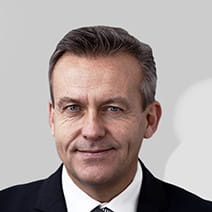Equity markets have endured a torrid 2022, with supply chain disruption, spiking inflation, rising interest rates and now worries about global recession. Europe has felt this acutely with the added horrors of war and energy insecurity but, while the near term looks bleak, history tells us to remain optimistic about the longer-term outlook. We continue to be excited about innovative companies and the opportunity that lies ahead in tackling the world’s problems – and Europe is a great place to find some of these overlooked pioneers.
What matters for long-term returns?
Right now, the market is voting for ‘value’ companies and against ‘growth’ – impacting the valuation multiples assigned to these stocks. Share price performance in the near term is highly dependent on profit multiples, as the chart below shows; most of the long-term return – 89% according to this study – is driven by revenue and profit growth. This is the market acting as a weighing machine, as per Benjamin Graham’s famous quote (in the short-run, the stock market is a voting machine; in the long-run, a weighing machine).

We have already written in depth on the current market rotation, why the short-term voting machine has shifted to value companies, and why we stay out of the game of guessing which way the market is shifting. Our focus on the Sustainable Investment team remains on the long term: we value companies on a five-year perspective and often hold stocks way in excess of that – for as long as the market is mis-appreciating their intrinsic value.
Given this investment horizon, it makes sense for us to concentrate on innovative companies helping to transition the economy towards a cleaner, healthier and safer future, which provide a long runway of growth.
Why we focus on sustainable innovation
Over the past 21 years running the Sustainable Future funds, we have focused on companies aiming to meet sustainability challenges; this strategy offers long-term growth and durable competitive advantages.
To go back to first principles, if you examine how positive change happens, there are three actors at work in the innovation cycle – academia and research institutions, government and civil society, and business and finance. First, understanding develops around a particular issue and likely ways to resolve it (air pollution and the associated health impacts, for example), then society/government lay the groundwork for action via new regulations, taxes and other incentives (such as European vehicle emission standards in this case). Finally, companies take advantage of the opportunity to develop, commercialise and distribute solutions, including catalytic converters and now electric vehicles.
Such innovative businesses are able to grow their earnings exponentially over the long term – but this requires two conditions: (i) a growing market opportunity well into the future and (ii) persistently high returns on capital invested in the company. Tackling tough sustainability challenges like the climate crisis, digital security and affordable healthcare provides a strong a tailwind of growth for decades to come. Equally important, companies embedded in the innovation cycle tend to face less competition due the novelty of their product or service, which enables them to generate strong profits and high returns on capital.
At present, this type of high-growth company is unpopular in the market, with higher interest rates impacting near-term valuations. But again, we keep our focus on the long-term opportunity for these businesses and, at current valuations, are optimistic about returns from here.
Overlooked European innovation
Innovation, then, is a key component of growth and long-term shareholder returns but Europe has long been seen as the old man of equity markets, incapable of developing such pioneering businesses. The Continent is known for old economy companies in the consumer staples, industrials, and luxury goods sectors and the perception is that ‘innovation’ only happens in California’s Silicon Valley – but we could not disagree more.
Europe is a fantastic place to find those rare gems that combine growth and high returns on capital, with the foundations of innovation in place. The region has world-leading universities and research institutions, a highly educated workforce, high research and development spend, and, as the chart below shows, already accounts for half of global patent registrations. Despite that idea around the FAANG (Facebook, Amazon, Apple, Netflix, Google) businesses and US innovation, 2019 data from the European Patent Office shows the US accounted for just a quarter of applications versus 47% for Europe, with Germany leading the way at 15%.

As further evidence of this trend, the World Intellectual Property Office’s 2020 figures show Switzerland and Sweden at the summit of its Global Innovation Index, putting the US in third place, with the Netherlands, Denmark, Finland and Germany also featuring in the top 10 (of 131 economies around the world). World Bank figures show Switzerland spends around 3.4% of its GDP on research and development, with 3.3% for Sweden, versus 2.8% for the US and just 1.7% for the UK, which took fourth spot on the WIPO Index.

We highlight Koomey’s Law as an example of world-beating sustainable innovation happening in Europe. The global economy continues to digitise at pace, with computing capacity and associated energy consumption increasing exponentially. Back in the 1970s, one of Intel’s founders Charles Moore predicted that processing power would double every two years – and this prescient forecast is now enshrined as Moore’s Law.
A less famous prediction is known as Koomey’s Law, stating that processor energy efficiency also doubles every 18 to 24 months, following a similar trajectory to Moore’s. Posited by Professor Jonathan Koomey in a 2010 paper, this idea is incredibly important in tackling climate change and explains why we can all have incredibly powerful computers in our pockets on phones, with roughly a hundredfold improvement in processor energy efficiency every decade.
Moore, Koomey and their respective laws are vital in ongoing human progress and the company at the centre of all this is not based in Silicon Valley, it is Dutch business ASML. This is the world’s leading lithography company, selling the machines used to manufacture the chips that power our computers. ASML has been operating at the boundaries of physics for the last 50 years, innovating so much that it has virtually no competition, which results in enviable profitability. It relentlessly invests in technology to drive future growth and high levels of profitability have produced phenomenal compound growth and shareholder returns. This has been a core holding of ours for 10 years, long before it was fashionable, and is a great example of the sustainable innovation opportunities available in Europe.
The missing piece – funding for innovation
While Europe has always had world-leading science and intellectual property, however, where the region has lagged behind US counterparts is in commercialising these ideas. Take the internet revolution and the trillions of dollars generated by the FAANGs as a case in point – not one European business has featured in this generation of technology companies.
We believe the reason behind this lies in funding – the missing piece to fuel innovation. The US has a well-established and deep-pocketed venture capital market, which has been providing patient capital to entrepreneurs since the 1970s. Famous funds like Benchmark, Sequoia Capital, Y Combinator and Andreesen Horowitz invest the early-stage capital required to build companies that now dominate the S&P 500.
European investors have recognised this and are firmly in the race to catch up with our US cousins. Venture capital firms like Index Ventures, HV Capital, Balderton and Kinnevik (a portfolio holding) are funding new European start-ups that have grown into successful businesses, such as Revolut, Adyen, and Hellofresh.

From 2012 to 2021, as the chart above shows, there has been a fifteenfold increase in venture capital funding (according to crunchbase.com figures), more than tripling from – an admittedly pandemic hit – 2020 to near £120 billion in 2021. This will eventually filter through to public markets and drive strong returns for investors paying attention to an overlooked opportunity, and we will focus on the Silicon Vikings – the growing number of Nordic and Baltic businesses driving innovation in their respective regions – in an upcoming article.
KEY RISKS
Past performance is not a guide to future performance. The value of an investment and the income generated from it can fall as well as rise and is not guaranteed. You may get back less than you originally invested.
The issue of units/shares in Liontrust Funds may be subject to an initial charge, which will have an impact on the realisable value of the investment, particularly in the short term. Investments should always be considered as long term.
Some of the Funds managed by the Sustainable Future team involve foreign currencies and may be subject to fluctuations in value due to movements in exchange rates. Investment in Funds managed by the Sustainable Future team involves foreign currencies and may be subject to fluctuations in value due to movements in exchange rates. The value of fixed income securities will fall if the issuer is unable to repay its debt or has its credit rating reduced. Generally, the higher the perceived credit risk of the issuer, the higher the rate of interest. Some Funds may invest in derivatives. The use of derivatives may create leverage or gearing. A relatively small movement in the value of a derivative's underlying investment may have a larger impact, positive or negative, on the value of a fund than if the underlying investment was held instead.
DISCLAIMER
This is a marketing communication. Before making an investment, you should read the relevant Prospectus and the Key Investor Information Document (KIID), which provide full product details including investment charges and risks. These documents can be obtained, free of charge, from www.liontrust.co.uk or direct from Liontrust. Always research your own investments. If you are not a professional investor please consult a regulated financial adviser regarding the suitability of such an investment for you and your personal circumstances.
This should not be construed as advice for investment in any product or security mentioned, an offer to buy or sell units/shares of Funds mentioned, or a solicitation to purchase securities in any company or investment product. Examples of stocks are provided for general information only to demonstrate our investment philosophy. The investment being promoted is for units in a fund, not directly in the underlying assets. It contains information and analysis that is believed to be accurate at the time of publication, but is subject to change without notice. Whilst care has been taken in compiling the content of this document, no representation or warranty, express or implied, is made by Liontrust as to its accuracy or completeness, including for external sources (which may have been used) which have not been verified. It should not be copied, forwarded, reproduced, divulged or otherwise distributed in any form whether by way of fax, email, oral or otherwise, in whole or in part without the express and prior written consent of Liontrust.
















